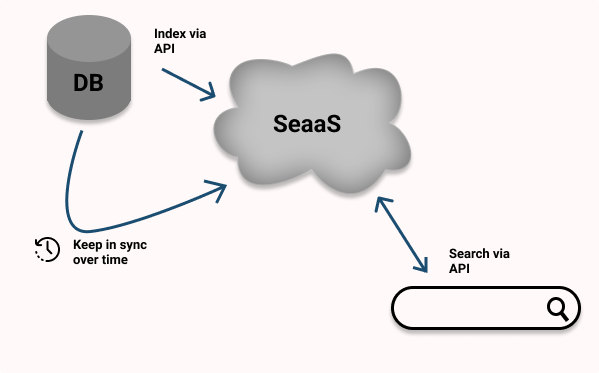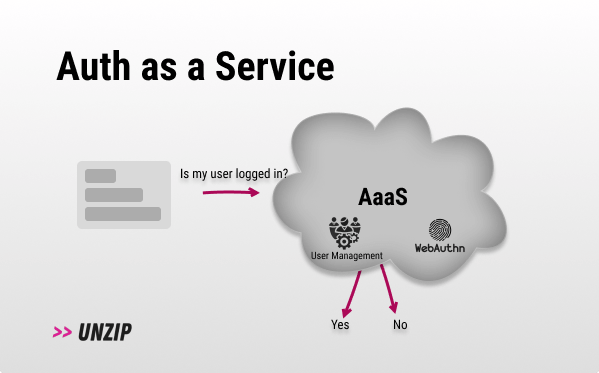0x002 - Search as a Service 🔍

Hi, y’all! This is the second issue of unzip.dev, a newsletter dedicated to developer trends, where we unpack trending dev concepts. My name is Agam More, and I’m a developer generalist who loves learning & sharing. Join the ride and have fun!
I wanted to thank @TomGranot and @KtzAndy for their great insights on this issue.
Search as a Service
Heads up! Please note that for this newsletter issue, we’re adopting the term SeaaS to mean “Search as a Service” 🏴☠️
TL;DR:
- Problem: Developing robust search functionality for your application is a challenging task.
- Solution: Outsource the search function to an external (mostly hosted) search service, which includes indexing and sometimes pre-built UI - so you don’t have to build them.
- In sum: Several websites already use SeaaS quite heavily, but pricing could be a dealbreaker.

How does it work? 💡
- You push any piece of data you want to be indexed to the SeaaS.
- The SeaaS indexes the data #magic.
- You integrate the SeaaS in your application, in one of two ways:
a. Using the pre-built search UI they provide.
b. Connecting your own frontend with the SeaaS API. - You configure your database to sync changes over time with the SeaaS, so your index is continuously up-to-date.
Use cases ✅
- You need to add search functionality without wasting time on maintaining self-hosted Solr/Elastic services, or re-inventing the wheel.
- Your regex and
greps aren’t working well enough as a search mechanism - you want to improve your search. - You want advanced features like personalization or voice search.
- Your data is spread across different data sources. Via a consistent API, you could aggregate the data, so they can be searchable in one place (This functionality is sometimes referred to as “Federated Search”).
Why? 🤔
- Less work: No need to implement and maintain the search infrastructure, it's all managed. Focus on your core business.
- Scaling is done by the SeaaS - if cost isn't a major concern, scaling is solved.
- Enterprise-grade search: Building a robust search engine requires a lot of know-how and work, why not delegate it? (full-text search is hard, and no, regex won’t scale well 🧙♂️ WiseWords™)
- Advanced features out-of-the-box:
- Personalization, like user intention, “python” might mean a snake for one user and a programming language for another (see Algolia’s personalization)
- Federated search (searching multiple data sources).
- Voice search, mobile search, geo search, auto-completion.
- Out-of-the-box analytics: Use pre-built dashboards and analytics that could give you insights generated from your user’s searches.
- Compliance: No need to manually account for GDPR or CCPA - you save time on deletion requests, information inquiries and more chores.
Why not? 🙅
- Special cases: General-purpose solutions might not fit all complex/specific use cases.
- Expensive: Gets expensive at scale (see comments here and here on Algolia’s pricing)
- Sensitive content: You have data that you don’t want 3rd parties to process.
- On-premises: A requirement, unless you go the open-source path.
Tools & players 🛠️
- Algolia - The OG SeaaS, closed-source and managed.
- typesense - Open-source algolia alternative, also provides a hosted service.
- swiftype - Elasticsearch’s take on algolia, simplifying elasticsearch.
- yext - Self-described as “AI search” as a Service.
- AWS CloudSearch - Using Solr behind the scenes.
- Azure Cognitive Search - Azure’s take on SeaaS.
- websolr - Hosted SeaaS based on Solr.
- MeiliSearch - Open-source Rust based SeaaS.
- Seekstorm - Seem to be a cheaper competitor to other hosted solutions.
- search.io - Yet another SeaaS.
- appbase.io - SeaaS on top of Elasticsearch with a search-tweaking interface.
Note: I will indicate any kind of ad or sponsorship (none here), and no, it won’t affect my choices unfairly.
Forecast 🧞
- Pricing changes: It seems like the current SeaaS pricing is a hard sell for mass-market adoption (this is what SeekStorm are building their pricing model around). Until then, self-hosted solutions or less feature-rich solutions like the cloud providers’ services will be the reasonable way to go.
Who uses it? 🎡
- Hacker news uses Algolia extensively.
Extra
- For search UI components, you might want to check Reactive Search (React and Vue supported).
- If you are interested in the system design behind search engines, check out this article and also its follow-up article.
- You might want to check Benjamin Read’s summary of players.
- Fireship, one of my favorite YouTube channels just released a video about how to use the Redis search module.
As a developer, it’s really hard to gauge the quality of my writing. It feels like using those old room-sized, punched-card computers where you had to wait all weekend for the results and only then get feedback 😪 So your comments are, truly, most appreciated:
Tweet at me @agammore or simply reply to this e-mail.
Why not help your friends by sharing this with them? ❤️


